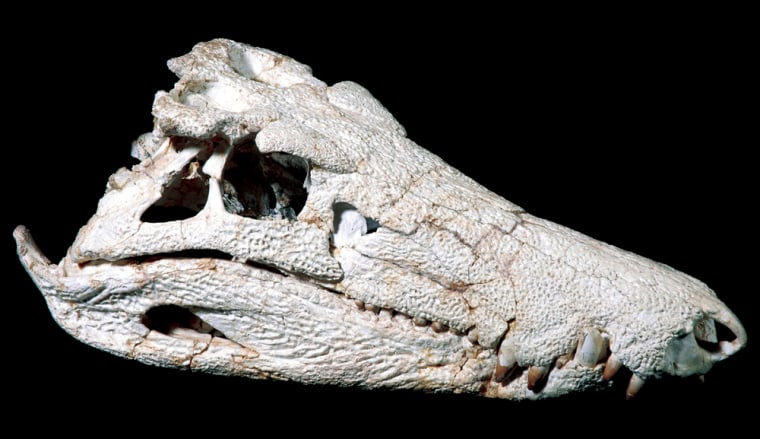The discovery of a nearly intact fossil of a prehistoric crocodile is teaching scientists what the world was like before the continents were separated by oceans, a Brazilian paleontologist said.
A reproduction of the previously unknown creature -- dubbed Uberabasuchus Terrificus, or the terrible crocodile of Uberaba -- was unveiled Wednesday at the Federal University of Rio de Janeiro.
Uberabasuchus lived 70 million years ago and was smaller than today's crocodiles -- only about 10 feet long and weighing about 300 kilograms (650 pounds), said paleontologist Ismar de Souza Carvalho.
"It's important because the fossil was extremely well preserved, with 85 percent of its skeleton practically complete and intact," he said.
Carvalho said Uberabasuchus lived on land -- it was named because the fossil was found near Uberaba, an inland city in southeastern Brazil. It probably carried its body high off the ground on sturdy legs and was a strong and voracious hunter, he said.
"We're learning about a new species of crocodile, the ecosystem of 70 million years ago, and the evolution of the land crocodile on the ancient continent of Gondwana," Carvalho said.
Scientists believe the continents then were joined in a huge land mass, which some call Gondwana. Fossils similar to Uberabasuchus have been found in Africa and in Antarctica, which possibly were linked to South America.
Despite some similarities with modern-day crocodiles, Uberabasuchus became extinct when the other great dinosaurs died out, and it has no relation to today's crocodiles, Carvalho said.
Brazil has drawn international attention for its recent discoveries of prehistoric creatures.
In December, scientists unveiled a replica of Unaysaurus tolentinoi, an ancestor of the huge Brontosaurus, that lived 230 million years ago in what is now southern Brazil. Experts said it was more closely related to fossils found in Germany than to dinosaurs from neighboring Argentina.
Zootaxa, a scientific journal published in New Zealand, said Unaysaurus "differs from all other dinosaurs."
Carvalho predicted there was more to come.
"Important new discoveries are practically certain," he said.
